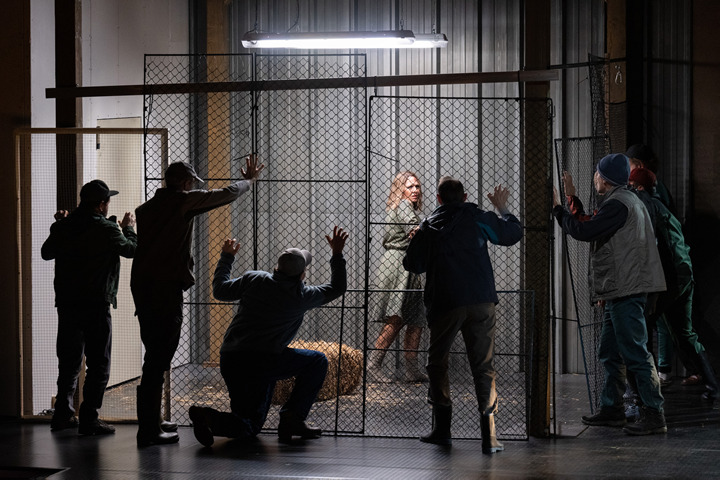| Opera Reviews | 6 May 2024 |
Rossini's thieving magpie lands in Viennaby Moore Parker |
|
Rossini: La gazza ladra |
|
 |
|
|
Oddly neglected, this mid-period opera semiseria which is chronologically sandwiched between La cenerentola and Armida saw its world premiere on 31 May 1817 at La Scala in Milan. This reading by Director Tobias Kratzer leaned - not inappropriately - much towards the seria end of the scale, while managing some lighter moments in particular with his handling of the magpie itself. Video screenings (concept: Manuel Braun and Jonas Dahl) serve to present a kind of Leitmotiv through which the thieving bird is depicted from its own perspective - stealing eye-catching objects such as lost house keys, or a crucifix necklace from a graveyard - before landing unwittingly in captivity by entering an empty bird cage (an image echoed later with Ninetta’s confinement in court) with Lucia the author of imprisonment in both cases. Thereafter the bird’s-eye (with blinking included!) feature comes and goes as the drama progresses with the magpie both an observer and perpetrator at significant moments - quirkily arousing the image of a high-flying puppeteer manipulating the characters’ fate below. For the entirety, a fortepiano and performer (Robert Lillinger) remain on stage as a kind of pendant observer. MusikTheater an der Wien’s current home in Vienna’s Messepalast provides a fair expanse to any stage designer, and here the basic four-segment (two-up, two-down - left and right) set leaves a generous central space for videos and sufficient depth for ensemble scenes - as well as appearances by various vehicles which begin with a tractor for Fabrizio’s entrance and continue with a period (rather than vintage) Mercedes for Gottardo, and ultimately a bicycle to bring the King’s pardon delivered by Austrian Post which saves Fernando’s neck. Updated, but undefined (other than evidently in some failed state of the 1970’s or 80’s) - with uniformed soldiers in rule, the staging unravels somewhat in Act 2 with Ninetta’s makeshift jail cell and its subsequent transformation into a courtroom while vis-a-vis Act 1’s redundant kitchen remains - fully illuminated - housing the rather forlorn antique piano and player. While full of inspired music by the Bel Canto master, the work is an undoubted challenge to any director - and despite well-defined characters and their interaction by Kratzer and his team, certain scenes ultimately presented an unfulfilled test of credibility due to logistics. The cast is well-balanced and potent, with Nino Machaidze making the leading contribution of the evening as Ninetta. This fine artist’s many qualities shone brightly in an interpretation which developed finely and sincerely with the plot. Superb in Rossini’s lyrical lines and generally succeeding in his demanding florid passages with a richly-warm timbre (perhaps a touch too broad and mature at times for the role), she yet exhibited a lightness and facility in moments above the stave which reminded of her dazzling Juliette at the Salzburg Festival in 2008 when replacing a pregnant Anna Netrebko, aged only 25. Her Beaux, Giannetto was taken by Russian tenore di grazia Maxim Mironov, whose 20 years in the business have seen appearances in many of the world’s leading houses. He indeed played a fine foil to the heroine, displaying a skilled bel canto line and technique to compliment a sympathetic stage figure. Argentinian-born Nahuel di Pierro was an outstanding Gottardo - blessed with a natural (and here ideally typecast) stage presence, while boasting a cultivated, searingly-projected bass baritone which scanned all of Rossini’s demands effortlessly. As the pubescent Pippo, Diana Haller donned her trouser role with impressive ebullience and credibility - mellowing affectingly from the initial rebellious youth to expose heartfelt affection for Ninetta, in a reading well-underscored by a vibrant, wide-ranging mezzo. Marina de Liso’s well-scaled Lucia was another delight - well-sculpted and nicely underplayed, while her stage spouse, Fabio Capitanucci, too made the most of his opportunities as Fabrizio. Ninetta’s father, Fernando has a challenging - if somewhat thankless - part in the drama which Paolo Bordogna well-mastered with a resilient, if at times, somewhat boorish tone. Riding on the experience of over 90 major parts, Riccardo Botta created more than a cameo out of the delectable peddler, Isacco, while the remaining supports, Johannes Bamberger (Antonio), Timothy Connor (Giorgio), Alexander Aigner (Ernesto), and Zacharias Galaviz (Il Pretore) all well-complemented the leads. The Arnold Schoenberg Chor appeared in particularly fine fettle while the ORF Radio Sinfonieorchester Wien under Antonio Fogliani guaranteed for an accurate and arresting reading. The magpie enjoys the final moments - or the last squawk, so to speak! Finally set free by Ninetta to rise over the venue’s rooftop, temptation seduces the bird to the nearby Kunsthistorisches Museum, and specifically to Cellini’s legendary Saliera - the 16th Century treasure famously stolen from the museum in 2003, to be returned three years later upon admission of guilt by the thief.
|
|







